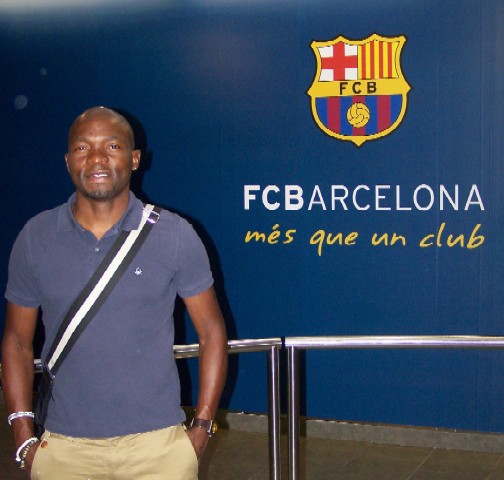By Sona Walla – December 15, 2011
The current Barcelona squad is far too creative, too quick, too versatile, and clearly too much of a team for their sworn rivals Real Madrid to cope with. The Catalan side also has the added dimension of possessing big time experienced players who are knowledgeable of exactly when to step up as individuals to re-direct the team in difficult moments. Barely three and a half years in charge, Barcelona coach Pep Guardiola and his gifted bunch appear equipped to handle all of football’s questions and imponderables. Key moments in the latest “el Clasico” demonstrated just that.
Real Madrid, it must be said are a much different team this season. Led by master coach Jose “the special one” Mourinho, the Merengues now seek out rather than wait for opponents, pressure much higher up the field and are vertical and deadly on the counter-attack. But they themselves could not have conjured up a more fortunate start than the Victor Valdes gift merely 23 seconds into the match. Hurried by Madrid’s very first wave of pressure, the normally reliable Catalan goalkeeper turned over the ball twenty-five yards from his goal and the prowling Madrid attack pounced to promptly surge ahead. While the bulk of the 79,900 Merengues fans were still scrambling to find their seats in their Santiago Bernabeu fortress, Barcelona were already seriously destabilized. Real, however, were unable to capitalize on their advantage and it was the visiting Catalans who demonstrated superior mental fortitude by re-organizing rapidly to strike back within the half hour. If Barcelona are a big team, Lionel Messi is unquestionably their biggest player. Eternally decisive, the diminutive Argentine was the predictable catalyst as he exploded into one of his trademark axial runs into the heart of Madrid’s defense before releasing Guardiola’s new signing Alexis Sanchez to conclude matters. The buoyant Santiago Bernabeu stadium suddenly fell into a morgue-like silence.
The pause seemed to further settle Guardiola’s side who inevitably began controlling match tempo via Xavi and Iniesta, the depositories of Barcelona’s “possession first” football philosophy. When fortune abruptly decided to intrude again, this time in favor of the Catalans as a deflected Xavi shot slipped past the desperately flailing arms of Madrid’s goalkeeper Casillas, it left the match at a pivotal point. As if aware it was dealing with two giants, its two most fiercely competitive sons, the game of football suddenly asked of Real Madrid a reaction equivalent to Barcelona’s in the first half. It was at this moment that the better team was revealed.
Moment #3 – The tactics of seizing the day
Suddenly trailing and unable to dictate play, Real seemed disoriented and increasingly desperate. The desperation translated into precipitation and ultimately into a failure to capitalize on the chances that fell its way to draw level. Unlike Messi, Madrid’s superstar Cristiano Ronaldo seemed to crack under the pressure. Barcelona on the other hand grew in confidence and composure, clearly sensing the opportunity to deliver the crucial killer goal and true to its nature… set out in search of it.
Whether by design or as a result of Real’s high pressure, Barcelona’s faux-fullback Danny Alves who normally occupies himself with mundane defensive tasks only when he is not raiding down the opponent’s flank as a winger, had begun the match quite conservatively. Midway through the first half, deft tactician Pep Guardiola had boldly reorganized his troops by pushing Alves up into the midfield and asking holding midfielder Sergio Busquets to drop into a now three man back line to provide defensive cover whenever the Blaugranas lost possession. It was a move that recalled just how much influence Dutch football legend and former Barcelona coach Johan Cruyff still has on Guardiola. Now in search of the match-defining third goal, Guardiola implored his hard-running Brazilian to assume an even more aggressive winger role, giving his team added width and a numerical advantage on the right flank . The daring Catalan coach was soon rewarded . Alves, who needs no prodding on attack-oriented missions, repeated raids deep into Madrid’s defensive lines. An umpteenth run by the inevitable Messi drew the Real Madrid defense centrally only to spring Alves down the flank into acres of space and the Brazilian coolly found team mate Cesc Fabregas at the end of a superb rainbow cross for an emphatic conclusion.
The tale of the two giants came to an abrupt end and with a result that is becoming alarmingly redundant for Real Madrid.
This was Guardiola’s fourth win at Madrid’s legendary Bernabeu stadium since he took charge of Barcelona in 2008. One can only wonder what psychological effect this latest brutal defeat will have on Madrid’s players and coach.
After completely dismantling the sides of icon Sir Alex Ferguson twice in Champions League finals and now consistently battering the “special” off Jose Mourinho who was widely indexed as football’s best manager, young Pep Guardiola is increasingly looking like a genius amongst his peers. Unrelenting in his drive to combine style with results, the young Spanish coach has won every available trophy and remains a thinking man’s coach as his in-match adjustments in this latest Clasico reiterated. An astounding accomplishment considering that Barcelona is the first professional team he has coached. He should certainly go down in history for tweaking an already excellent Barcelona tactical system and particularly for introducing and mastering the concept of playing without a designated center forward (#9). Guardiola’s fluid system rests on impeccable ball possession and constant movement that eventually dictate when his players suddenly ghost in to penetrate the critical central space behind the opponent’s defensive line to conclude. The combination of his technically gifted and tactically versatile players with his cutting-edge football concepts have transformed Barcelona into a formidable winning machine that is also pleasing to the eye.


